New Rules Lead to Old Result for U.S. Men Versus Croatia at 2018 FINA Water Polo World Cup in Berlin
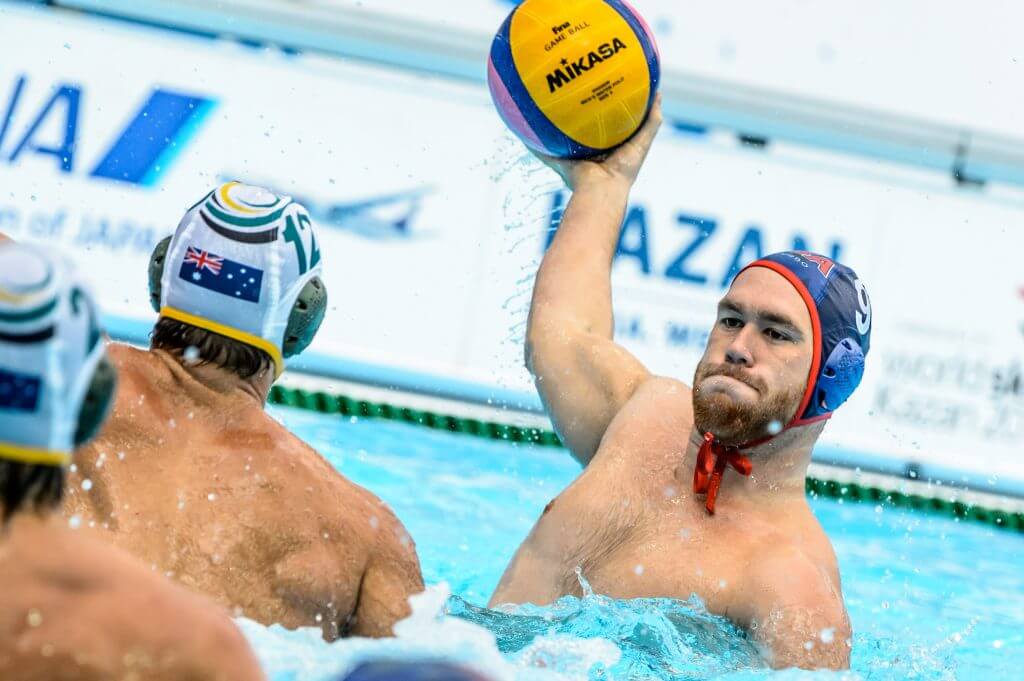
By Michael Randazzo, Swimming World Contributor
BERLIN, Germany. Yesterday the U.S. Men’s Senior Water Polo Team opened up the FINA Men’s Water Polo World Cup 2018 against a familiar foe; Croatia is again in Team USA’s bracket, much as they were the last time the U.S. teams collided, last June at the FINA Men’s Water Polo World League Super Final 2018, which was 10-7 in favor of the Croatians
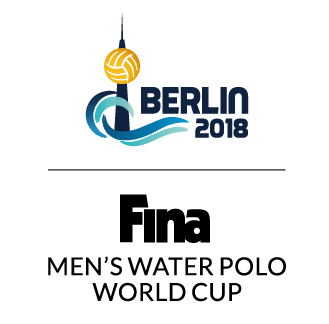
What is new is a host of proposed rule changes that may have a profound impact on the sport’s future. In the end, these new rules—which are being tested by senior players for the first time at this tournament—did not have any impact on what has become an all-too-familiar outcome: Croatia got out in front early against the Yanks and registered a 15-10 victory. Croatia was led by captain Andro Buslje and Loren Fatovic, who scored three goals apiece. For the U.S., Alex Bowen had a hat trick, while Dylan Woodhead, in his first-ever action as a member of the U.S. Senior National team, scored twice and drew a five-meter penalty.
Other results from the first day of action in Berlin’s including a noteworthy upset by the home team, as the Germans, playing in the final match of the day, defeated Hungary 12-10 on the strength of three goals apiece by Ben Reibel and Julian Real. The other results were much more predictable; Serbia dismantled South Africa by a score of 21-3 and Australia thoroughly outplayed Japan behind four goals by Aaron Younger to register a 14-6 win.
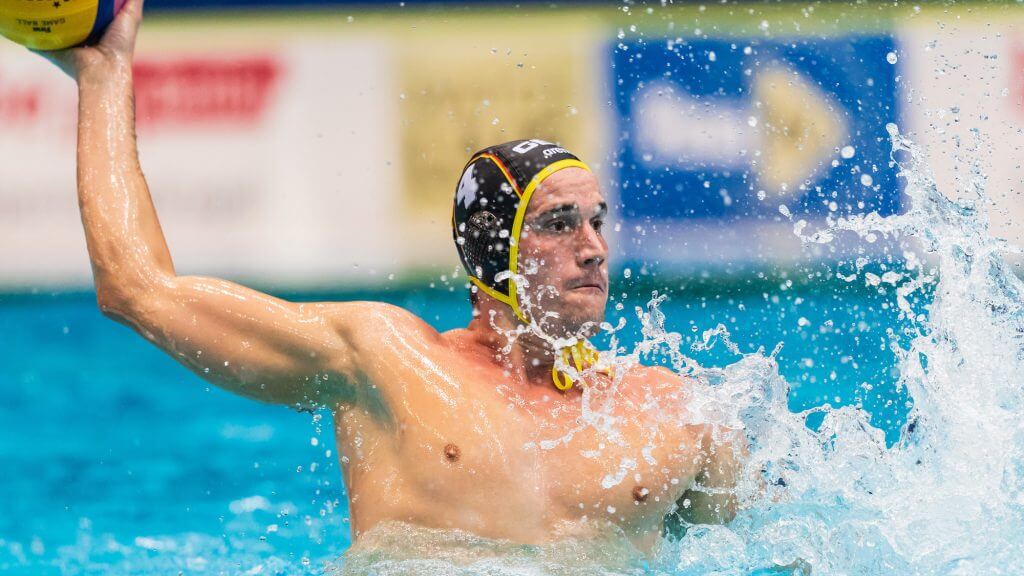
Germany’s Julian Real. Photo Courtesy: Sportphoto.shop
In the Croatia vs. U.S. match, the Americans scored on their first possession, as Alex Obert batted in a goal past goalie Marko Bijac with his team a man-up. But that would prove to be their only lead. Quickly countering on their next possession, the Croatians got a power play goal from Marko Macan to even up the match, They finished out the quarter leading 3-2
The U.S. went down by 7-4 at intermission thanks to goals by Buslje, Macan, Lovre Milos and Javier Garcia Gadea, but the American rallied in the third period on goals from Bowen and Luca Cupido. The momentum swung back to the Croatians, thanks to goals 50 seconds apart from Buslje and Ante Vukicevic, then Garcia Gadea effortlessly flicked a left-handed shot past U.S. goalie McQuin Baron a minute later to give the Croatians an insurmountable four-goal bulge.
The fourth quarter was the Loren Fatovic show. A 21 year-old Croatian national team member whose father Elvis is now the head coach for Australia, Fatovic did not registering on the scoresheet in the first three periods, but made up for that oversight with three scores in the game’s final four minutes, including an impressive maneuver where he beat an over-aggressive Cupido to find an open path to the American goal, where he lobbed a shot over the Baron. Max Irving (2 goals) Bowen and Woodward scored to keep the match close, but the Croatians were simply much more adept with the man advantage, hitting a robust seven of their 13 chances to five of 11 for the Americans.
Team US has now lost three of it’s last four matches against Croatia, the lone bright spot for the American being a scintilating 11-10 win in Budapest last June.
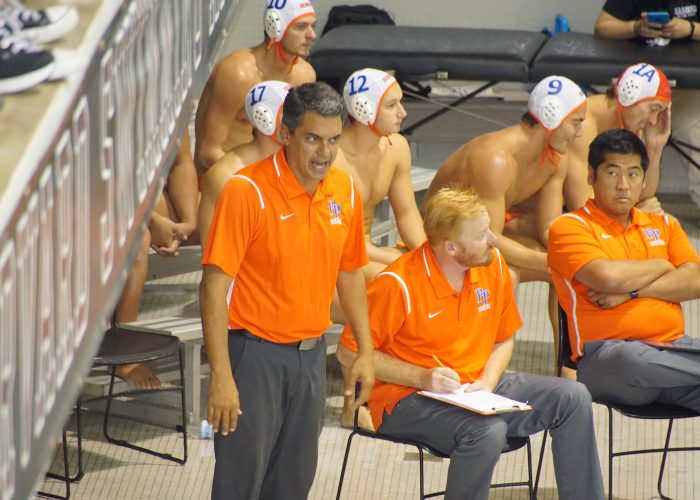
Alex Rodriguez. Photo Courtesy: Andrea Gross
The new rules did have some impact, and it was instructive to speak with U.S. Assistant Coach Alex Rodriguez about how they impacted this game and what the future holds for the implementation of changes.
“Some of the new rules are interesting,” Rodriguez said after the game, [but] I’d like to see them test them out longer than just this tournament.”
The veteran coach, who has been on Head Coach Dejan Udovicic’s staff for the past three years, complimented the idea of flying subs—that is, substitutes that quickly come in and out of the pool—especially given the biggest change being tested here in Berlin: benches of 11 rather than 13, which has been the norm for many decades. The shortened benches were a factor for both teams in yesterday’s match. Croatia was down a player because of a red card assessed in a previous FINA event, and the U.S. lost
to exclusions, leaving Udovicic with only two subs to choose from late in the game.
“This tournament’s going to be really tough,” Rodriguez explained. “Six games in six days with really no rest.”
He also detailed why only playing with one goalie was such a challenge: “If you have a goalie who’s playing bad he has to stay in.” He also pointed out that back-up goalies, who generally are significantly younger players brought along to gain experience, will be hurt because there’s little chance to get minutes in a one-sided match.
He added that the roster reduction, which has already been approved for the 2020 Olympics in Tokyo, is “not something that anyone in water polo wants.”
Coach Rodriguez’ thoughts on some of the other rules were equally compelling
About the amended foul call inside six meters, where a player fouled on the arm inside of six meters is awarded a penalty shot, Rodriguez wants consistency. “For example, if I got inside six meters and you foul me on my arm, there’s no ball in hand anymore inside six meters,” he said. “Why isn’t there a call outside six meters?
“No other sport has three different type of ways to call the same situation.”
He praised the rule that physical play will be reviewed after the match, with penalties potentially being assessed at a later date. This has the potential impact of cleaning up play.
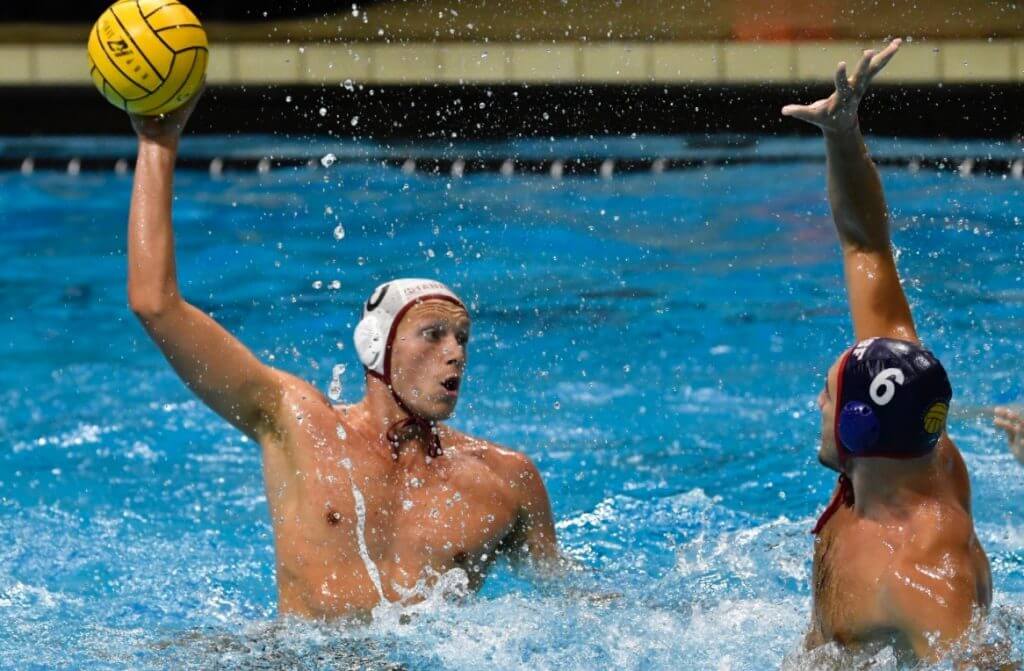
Dylan Woodhead. Photo Courtesy: Bryan Williams
“We’re trying to eliminate the physical play, which will free up the game,” Rodriguez said. “It’s a beautiful game but sometimes you just have big guys holding each other.”
Of course, there’s new rules, and then there’s what the audience can absorb. Late in the game it appeared that the referees allowed a goal where video display clearly showed the ball did not clearly cross the line, Then—after a significant delay—a double exclusion was called against Buslje and Roesle. The goal was not in fact allowed, but no explanation clarified what had transpired.
Rodriguez said that both the front goal judge and the referee recognized “pretty quickly” that it wasn’t a goal. But the audience did not, which is a lot of what’s currently wrong with the sport.
“[It] would be nice to have some clarification,” he said. “In other sports the referee talks to the crowd to explain the call. In our sport, we don’t.”
Perhaps that will be in FINA’s next new rule proposals.




.png)
Fancy that
Fancy that indeed! Now that I’m here in Berlin (a fantastic city, by the way) I’m of the opinion that the proposed rule changes are absolutely about the continued viability of polo as an Olympic sport. The problem is that some of these ideas are cosmetic at best, while others are simply too challenging to fit in place prior to the 2020 Games.
BUT, I’ve got five more games to see how this all plays out – and I’ll be on the beat for every minute of every game!
Your correspondent